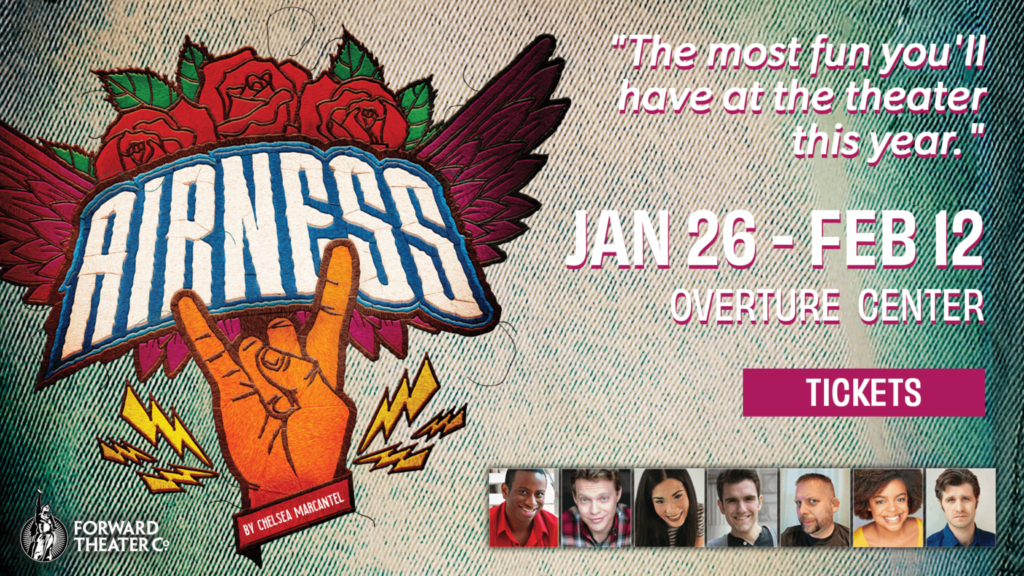By Mike Fischer | January 18, 2023

Learning How to Play
The legion of happy souls out there playing air guitar – c’mon, you know who you are – give voice to feelings for which we have no words. Air guitar is both irresistible and cause for embarrassment, which is why it’s usually done in private or when drunk.
At least by most of us.
Those brave and skilled enough to give public expression to such personal impulses are called artists. When those artists are air guitarists, they even compete in annual competitions, several of which form the backdrop for Chelsea Marcantel’s Airness, a fabulously fun piece being staged by Forward Theater that will melt faces in its Wisconsin premiere. It plays at the Overture Center between January 26 and February 12.
OK, I admit it: I was initially as skeptical as Marcantel’s Nina “The Nina” O’Neal – a real guitarist but an air guitar novice – about the whole concept of airness.
When walking into a Louisville theater five years ago for the world premiere of Marcantel’s play, “I wasn’t expecting much,” I confessed in my theater journal. “It’s about air guitar; I thought it would just be silly.”
But I walked away – I’m tempted to say I walked on air – knowing just how wrong I’d been. “I have seen few shows which so fully capture the magic of theater, or of any artistic endeavor,” I excitedly wrote later that night.
I stand by those words. To paraphrase one of the characters in Marcantel’s play, Airness is pure joy. Having endured the past three years, we’ve never needed it more.
The Purest Art Form
In taking us into the exciting world of competitive air guitar – yes, that’s a thing, and you can learn all about it by watching the excellent 2006 documentary, Air Guitar Nation – Airness takes us well beyond its witty and informed discussion of the relationship between Tom Waits and the Ramones, Nancy Wilson’s guitar technique, and all that’s wrong with Journey.
As one of the memorable characters in Airness observes, what he and his fellow performance artists do “might be pretend. But it’s serious pretend.”
Which makes air guitar sort of like theater, in a show that doubles as a love song to all those stage actors toiling in relative obscurity and making too little money for their love of an art form that rarely gets its props but still makes them happy. It’s no accident that America’s first air guitar champion – David “C-Diddy” Jung – was (and still is) an actor.
The world of air guitar that’s presented here gives us theater at its purest.
As one of its practitioners explains to Nina, air guitar is democratic and non-commercial. It can’t be commodified. Because it’s invisible, it can’t be stolen; because it’s non-instrumental, it can’t be used. With the exception of the play’s arch-villain, its practitioners aren’t for sale. They help each other, even as they simultaneously compete.
All of them seek that nirvana-like state known as “airness,” in which they transcend their initial imitation of guitar greats and instead disappear into the original personae they’ve created, with noms d’air like Cannibal Queen, Shreddy Eddy, Facebender, and Golden Thunder.
Living inside such personae, each of these characters can express their fullest, most complete selves – including “all the parts of myself,” as one character says, “that are freaky or loud or ugly or dangerous” in a world where they’re often pigeonholed as losers because they won’t conform.
Play It Forward
“When we’re here,” Facebender says at one point to Nina, all of those “real” world concerns drops away and “everything outside is irrelevant.”
Does that make air guitar escapist?
Well sure, in the same way that art always is, as it challenges us to willingly suspend disbelief and imagine other and better worlds. But while there may be no props and the axes being played are invisible, the stakes in Airness are real. Or in the words of real-life air guitar legend Zac “the Magnet” Monro, air guitar is “escapism but only in the sense that it’s more real than real.”
As chronicled in Air Guitar Nation, the young Finns who created organized air guitar competitions were inspired by visions of world peace in which we’d all make air, not war.
If everyone in the world were to play air guitars, these idealistic Finns reasoned, they wouldn’t be able to hold guns. Competition would breed respect and love rather than conflict; it’s somehow fitting that after being crowned air guitar champion two years in a row, Monro retired so that he might teach others how to achieve airness.
Even as the performers in Marcantel’s play shred their way toward airness, they devise onstage routines promoting world peace and racial harmony, while dreaming a common language that moves beyond patriarchy. Like Airness itself, they demonstrate an anti-establishment bent while oozing integrity and heart, empathy and love.
In short, they aspire to airness by ditching the rules and fears grounding the rest of us so that they might discover who they truly are. As one performer explains to Nina, achieving airness means finding the music that’s “an extension of your soul,” so that you might finally sing the body electric by learning to play the song of yourself.
“The first half of doing nothing is about disengaging from the attention economy,” writes Jenny Odell in How to Do Nothing, her terrific book about tuning out all the nattering noise so that we might learn how to truly listen. “The other half is about reengaging with something else.”
Airness throws down a similar challenge, while reminding us of something that the world of theater often forgets: art can be serious while still being wildly entertaining. Befitting its arrival at the start of a new year, Airness will offer you opportunity aplenty to reflect on how to live and be better. But most important of all, Airness will remind you just how much fun it can be to play.
For more information regarding and tickets to Airness, visit https://forwardtheater.com/show/airness.






